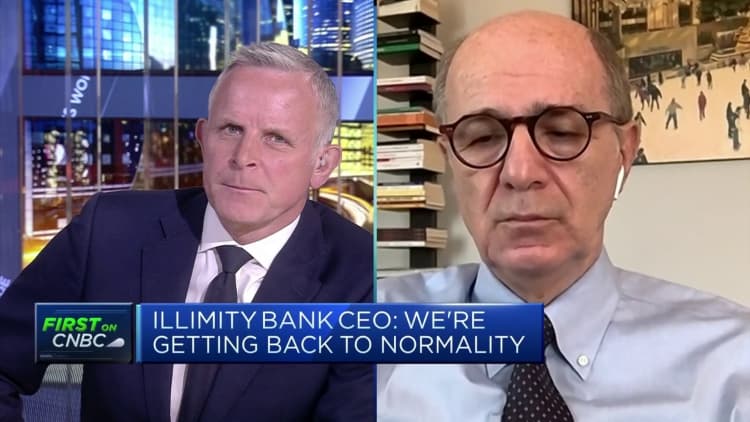HIROSHIMA, JAPAN – MAY 17: People walk beneath a banner promoting the Group of 7 (G7) summit at a shopping street on May 17, 2023 in Hiroshima, Japan. The G7 summit will be held in Hiroshima from 19-22 May. (Photo by Tomohiro Ohsumi/Getty Images)
Tomohiro Ohsumi | Getty Images News | Getty Images
The global debt pile grew by $8.3 trillion in the first quarter to a near-record high of $305 trillion as the global economy faced a “crisis of adaptation” to rapid monetary policy tightening by central banks, according to a closely-watched report from the Institute of International Finance.
The finance industry body said the combination of such high debt levels and rising interest rates has driven up the cost of servicing that debt, triggering concerns about leverage in the financial system.
Central banks around the world have been hiking interest rates for over a year in a bid to rein in sky-high inflation. The U.S. Federal Reserve earlier this month lifted its fed funds rate to a target range of 5%-5.25%, the highest since August 2007.
“With financial conditions at their most restrictive levels since the 2008-09 financial crisis, a credit crunch would prompt higher default rates and result in more ‘zombie firms’ — already approaching an estimated 14% of U.S.-listed firms,” the IIF said in its quarterly Global Debt Monitor report late Wednesday.
The sharp increase in the global debt burden in the three months to the end of March marked a second consecutive quarterly increase following two quarters of steep declines during last year’s run of aggressive monetary policy tightening. Non-financial corporates and the government sector drove much of the rebound.
“At close to $305 trillion, global debt is now $45 trillion higher than its pre-pandemic level and is expected to continue increasing rapidly: Despite concerns about a potential credit crunch following the recent turmoil in the banking sectors of the U.S. and Switzerland, government borrowing needs remain elevated,” the IIF said.
The Washington, D.C.-based organization said aging populations, rising health care costs and substantial climate finance gaps are exerting pressure on government balance sheets. National defense spending is expected to increase over the medium term due to heightened geopolitical tensions, which would potentially affect the credit profile of both governments and corporate borrowers, the IIF projected.
“If this trend continues, it will have significant implications for international debt markets, particularly if interest rates remain higher for longer,” the report noted.
Total debt in emerging markets hit a new record high of more than $100 trillion, around 250% of GDP, up from $75 trillion in 2019. China, Mexico, Brazil, India and Turkey were the largest upward contributors.
In developed markets, Japan, the U.S., France and the U.K. posted the sharpest increases over the quarter.
Banking turmoil and a ‘crisis of adaptation’
The rapid monetary policy tightening exposed frail liquidity positions in a number of small and mid-sized banks in the U.S. and led to a series of collapses and bailouts in recent months. The ensuing market panic eventually spread to Europe and forced the emergency sale of Swiss giant Credit Suisse to UBS.
The IIF suggested that corporations have undergone a “crisis of adaptation” to what it termed a “new monetary regime.”
“Although recent bank failures appear more idiosyncratic than systemic — and U.S. financial institutions carry much less debt (78% of GDP) than in the run-up to the 2007/8 crisis (110% in 2006) — fear of contagion has prompted significant deposit withdrawals from U.S. regional banks,” the IIF said.

“Given the central role of regional banks in credit intermediation in the U.S., worries about their liquidity positions could result in a sharp contraction in lending to some segments, including underbanked households and businesses.”
This contraction of credit conditions could particularly affect small businesses, the IIF said, along with causing higher default rates and more “zombie firms across the board.”
Zombie firms are companies with earnings that are sufficient to allow it to continue operating and pay the interest on its debt, but not to pay off the debt, meaning any cash generated is immediately spent on debt. The company is therefore “neither dead nor alive.”
“We estimate that around 14% of U.S. companies can be considered zombies, with a substantial portion of these in the healthcare and information technology sectors.”
Read the full article here




